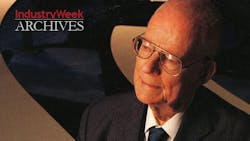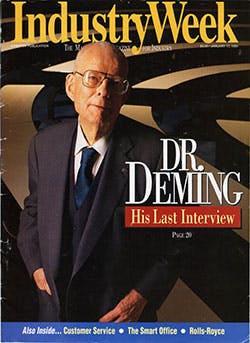Dr. Deming: 'Management Today Does Not Know What Its Job Is.' (Part 3)
Editor's Note: IndustryWeek caught up with W. Edwards Deming on Oct. 23, 1993, in what would be his last interview. This is the conclusion of the article that appeared in the Jan. 17, 1994, issue of IndustryWeek. Don't miss Part 1 and Part 2 of IW's conversation with Dr. Deming.
IW: Two words that are popular today in describing changes in American industry are downsizing and reengineering. What do these words mean to you?
Dr. Deming: Desperation. Management doesn't know anything else to do. They don't have the knowledge to manage with. All they can do is sack people. Crude. A crude way to do it. You only dig yourself into another pit.
IW: What is the role of government?
Dr. Deming: The responsibility of government is equity. If we do not keep equity in the forefront, we will destroy our society. Of the people, by the people, for the people. Sounds great. Doesn't mean a damn thing. The top priority of government is equity. Accused and the accuser both have a right to be heard. This is very inefficient, wasteful, you might say. But we dare not have it any other way.
IW: How does that apply to government's role and interaction with American business?
Dr. Deming: The main function of government is equity, and business must work within that framework.
IW: ISO 9000 seems to be the ticket to participating in the new world economy. Where is ISO 9000 going?
Dr. Deming: ISO 9000, 9001, 9002 are conformance specifications -- conform to requirements. Of course we must conform to requirements. But that's not enough; that won't do it. One must seek the nominal value of anything, what the best way is, not just pass the course. To meet specifications, do what is required -- that is not enough. You have to do better than that. Achieve uniformity about the nominal value, best value. Shrink, shrink, shrink variation about the nominal value. That is where you get your payoff; that is where you get ahead.
The main function of government is equity, and business must work within that framework.
IW: What about the Malcolm Baldrige National Quality Award and companies striving for the award. Does that equate to being on a mission to improve quality?
Dr. Deming: No, nothing could be worse. The evil effect of the Baldrige guidelines on American business can never be measured. If you had the Baldrige guidelines in front of you, you would see it asks for data, figures on what cannot be measured. The effect of training, for example. You may spend $20,000 to train six people in a skill. That benefit will come in the future. We'll never be able to measure that benefit. Never. So why do we spend that money for training? Answers are guided by theory. We believe that that training will have its effect on future output. And though we cannot measure that effect, we believe that it is positive. In other words, we govern our actions, our life, by theory. That's good. Without theory, we learn nothing. Theory has temporal spread. That is, the theory that we can hold on to must fit without failure events of the past and predict events of the future.
IW: Where are American business schools falling short ill design of their curriculum, the things they are teaching?
Dr. Deming: I'm afraid that what they teach is continuance of our present methods of management, which are failures. They teach how to fail, how to continue to fail.
IW: What should they be teaching?
Dr. Deming: I think the teaching ought to be on how to improve. Improvement, understanding of people, understanding of product. In other words, it would require what I call profound knowledge, of which I mean a view from the outside.
Dr. Deming: Yes. Quality. Quality is characteristic of a product or service that helps somebody and which has a market. Without the market, we don't stay in business. Sometimes the market has to be created. But, the market itself is not enough. For example, today, where are the makers of carburetors? Gone. Every engine had a carburetor. How could it run without one? The maker of carburetors made better and better carburetors, lower and lower cost, and went out of business. What happened? Came the fuel injector, which costs more than a carburetor, but does the job of the carburetor and a lot more. The fuel injector came in, carburetors went out. Carburetor manufacturers made a good product, better and better carburetors, lower and lower cost, happy customers. But that is not a sound basis for a continuance. You must take account of possible changes. The function of the carburetor, as everybody knows, is to put a stoichiometric mixture of fuel and air into the combustion chamber. That is its function. Now what is the best way to accomplish that? Maybe by a carburetor, maybe not. Fuel injection provides a better way. Fuel injectors took over the market. Carburetors went out, no matter how good they were. In due time fuel injectors will go out with a new kind of engine. Don't ask me what it might be; I know not. But you must think of function, not particular products.
IW: You are an amazing person. How do you keep going? What's your secret?
Dr. Deming: I love my work -- continue learning, advancement in presentation, advancement in understanding.

